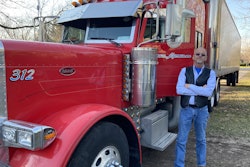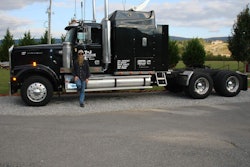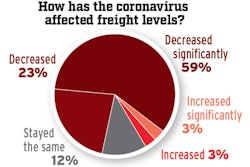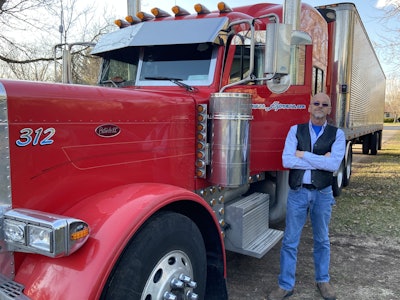 “We’ve been busy filling the cheese pipeline,” says Rick Sterling, owner of the two-truck Bluegrass Express of Oshkosh, Wisconsin. Should that change, he said, he’s prepared to lean on savings to get by. In the meantime, he and his driver have been working 16-hour days to help restock grocers and warehouses.
“We’ve been busy filling the cheese pipeline,” says Rick Sterling, owner of the two-truck Bluegrass Express of Oshkosh, Wisconsin. Should that change, he said, he’s prepared to lean on savings to get by. In the meantime, he and his driver have been working 16-hour days to help restock grocers and warehouses.Dewayne Lark, owner and operator of Lark Trucking out of Danville, Kentucky, said his cattle-hauling operation usually runs 10 to 12 loads a week, from Kentucky to Kansas or Nebraska and back. Those loads are doled out to himself and six other owner-operators contracted to his small fleet, generally enough to keep all of them busy.
The last few weeks, however, “we’re barely getting four loads a week,” he said. He and the other operators have been working in shifts, alternating taking weeks off “just to keep everybody getting a check,” Lark said.
Click here to view our full coverage of the coronavirus' impact on the trucking industry from the leading industry publications of Commercial Carrier Journal, Overdrive, Truckers News and Trucks, Parts, Service.
“Everything was decent, and all the sudden it collapsed,” said Lark, who’s driven a truck for 27 years, the last 16 as an owner-operator. In early February, he purchased for himself a 2019 Kenworth W900 and has a monthly payment on it. Likewise, he still has payments on a few cattle trailers.
He has enough in savings to keep the operation afloat for a few months. And he’s open to looking into some of the federal aid options available for small businesses, particularly if it means keeping his leased owner-ops in work. “If I don’t have trailers, those boys don’t have jobs,” he said, though he doesn’t like either option. “I don’t want the [federal] help, but if I have to, I guess I have to. I hate to lose my savings, but I guess that’s just how the cookie crumbles.”
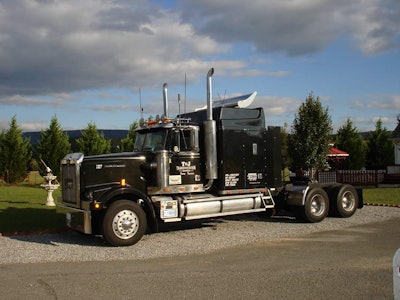 Timothy Barrett’s 1997 Western Star has been sitting idle for a few weeks after he hung up the keys when business soured and rates went south, he said. He’s been working a temporary job at Walmart until his loads come back.
Timothy Barrett’s 1997 Western Star has been sitting idle for a few weeks after he hung up the keys when business soured and rates went south, he said. He’s been working a temporary job at Walmart until his loads come back.The sudden, sharp economic fallout is one felt by many owner-operators and small fleets, no matter their type of freight. While some, like Lark, continue to scrape by on fewer loads, others are hoping for bridge loans available from the Small Business Administration to keep their business going. Some, however, have found temporary work until they can resume trucking.
Independent owner-operator Timothy Barrett of East Tennessee said he took a part-time job at Walmart after his main sources of business stopped. Otherwise, he said, “rate aren’t worth a crap.”
“I’m not real thrilled with it, but at least I’ll have some money coming in,” he said.
He hauls automotive parts from Tennessee to Arizona, ultimately bound for Mexico, and loads for concerts and events. “I am basically shut down,” he said. “I can go broke two ways: Hauling for nothing or not hauling. I’m not going to [run loads] and exchange money for fuel and drive the truck for free.”
He’s been an owner-operator since 1988 and driving since 1976. The 65-year-old said his 1997 Western Star has long been paid for. “I almost bought a new one in 2017,” he said, but held on to the ’97 Star and its pre-2000 ELD exemption. Now, he said, he’s glad to not have a payment. “If something starts popping,” he said, referring to loads coming back, “I’ll be there.”
“We applied for an SBA loan, and they sent back a thing saying they received it, so we’ll see,” said Carole Salyer. She and her husband run Donald Salyer Transport out of New Hampshire.
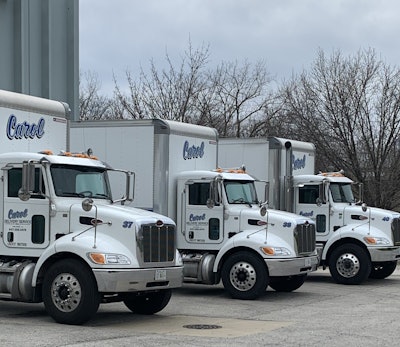 Owner-operator Fred Becker is the third-generation owner of Carol Delivery Service in the Chicago area. Parts of the LTL business have stalled, but they’re still working daily, even if half days. Becker said he’s applied for a federal aid bridge loan and is hoping to use it to pay his drivers. “We’ll get through this,” he said.
Owner-operator Fred Becker is the third-generation owner of Carol Delivery Service in the Chicago area. Parts of the LTL business have stalled, but they’re still working daily, even if half days. Becker said he’s applied for a federal aid bridge loan and is hoping to use it to pay his drivers. “We’ll get through this,” he said.The loans are part of Congress’ whopping $2 trillion federal aid package passed two weeks ago, intended to help small businesses make payroll (including paying oneself) and other monthly payments. Should the loan money be used for purposes stipulated by CARES, the Act requires banks to forgive the loans, funded ultimately by the Small Business Administration.
Like Lark, the Salyers have owner-operators contracted to their small fleet, which hauls heavy equipment for dealerships like Komatsu and Caterpillar, and for construction contractors. The dealership loads have dried up. “That revenue has shut down,” she said. But for now, construction projects continue, and so do some of the Salyers’ equipment loads.
“My husband and I haven’t gotten a paycheck,” she said. “The little bit of money” they’ve earned in recent weeks “has gone into overhead, maintenance and bills,” she said. Their six trucks are mostly “all just sitting in the garage.”
Rick Sterling, a cheese hauler based in Oshkosh, Wisconsin, said his two-truck Bluegrass Express has stayed busy. Grocery stores have rushed to restock on cheese, and “my orders tripled this week,” he said. And he hasn’t looked to price gouge — he’s maintained his per-mile rate pricing despite the surge in demand.
“I like to be fair,” he said. Likewise, he’s been kicking his driver a $125 weekly bonus on top of the extra pay for longer hours.
Work for his restaurant customers is mostly gone, he said. “I hate to see it dry up for them,” he said. “But I’ve got enough other business to keep me busy.” Should that change, he said he has enough in savings to make it for a few months.
“We’re rolling along,” says Fred Becker, a third-generation small-fleet owner who runs the three-truck Carol Delivery Service (founded by his grandfather) out of the Chicago area. He’s applied for an SBA loan. “Hopefully we’ll get it. That will at least take care of our drivers and customers,” he said.
He hauls wires, carriers, springs and stampings to manufacturing facilities. Those bound for medical manufacturing facilities have obviously stayed steady. “On the flip side,” said Becker, those bound for auto plants have been cut in half. He’s been paying his drivers for full days, though they’ve been working half-days.
“We’ll get through this,” he said. “We’re trying to keep our distance but do our job.”



